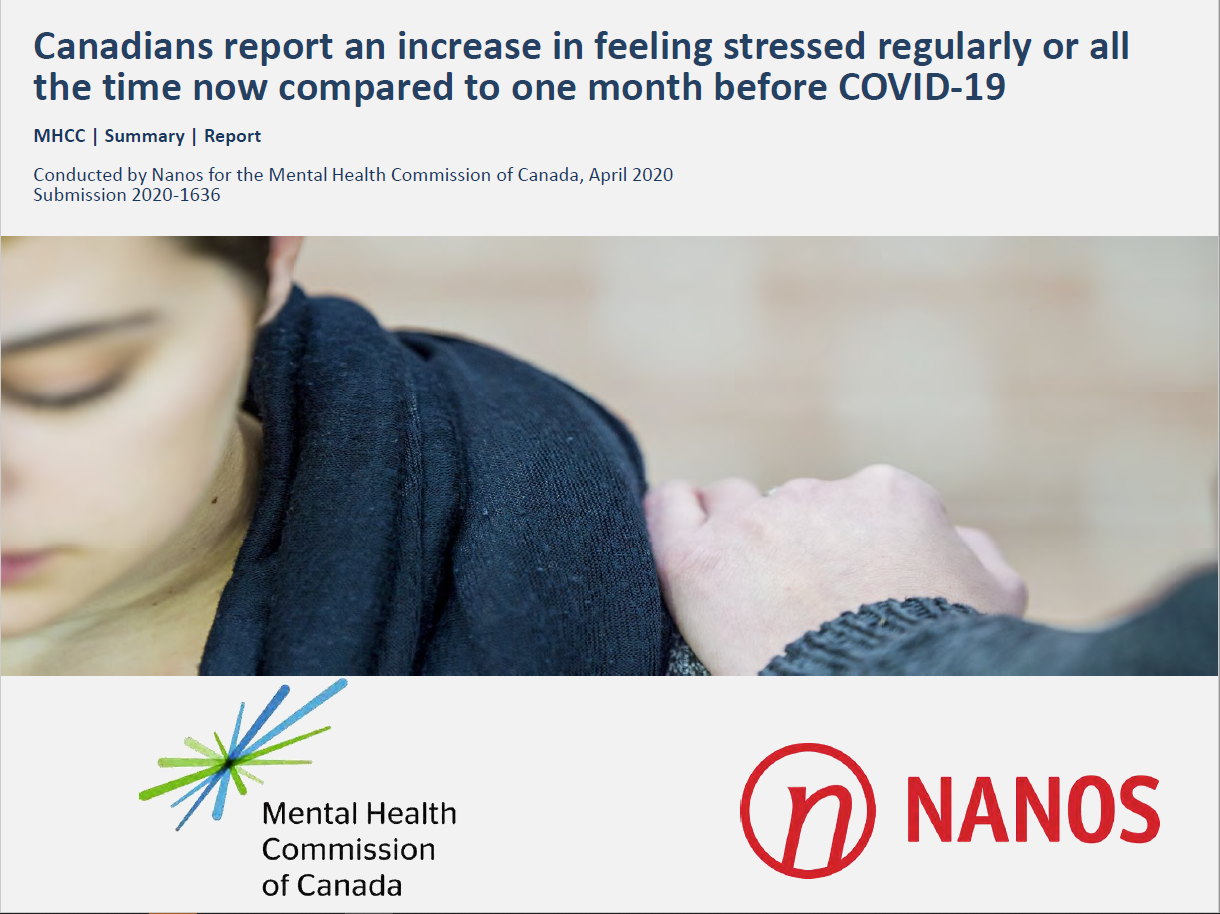If you are in distress, you can call or text 988 at any time. If it is an emergency, call 9-1-1 or go to your local emergency department.
- Reports, Research
Canadians report an increase in feeling stressed regularly or all the time now compared to one month before COVID-19
Canadians report an increase in their level of stress from the month before COVID-19 to now, and most often cite concerns about contracting or a family member contracting COVID-19 as the driver behind that stress. Canadians are more likely to report their mental health is worse or somewhat worse than before COVID-19 rather than better or somewhat better citing increased stress and uncertainty. The main concern of Canadians related to the impact of COVID-19 is personal financial hardship and economic impact and job loss, and Canadians most often rank keeping the economy healthy so people have jobs and income as the most important priority for the mental health of Canadians now and one year from now.
Canadians most often report they occasionally felt stress the month before the COVID-19 outbreak – One in two Canadians say thinking of the month before COVID-19 they felt stress occasionally (50%), while three in ten report they felt stress never (six per cent) or almost never (24%). Two in ten Canadians report they felt stress regularly (17%) or all the time (four per cent). Canadians 18 to 34 are more likely to report they felt stress regularly (26%) or all the time (seven per cent) than Canadians 55 plus (eight per cent regularly; one per cent all the time).
Canadians are four times more likely to report their mental health is worse or somewhat worse than before COVID-19 rather than better or somewhat better – Just over one in two Canadians (51%) report their mental health today is about the same as before the COVID-19 pandemic, while nearly four in ten report their mental health is somewhat worse (28%) or worse (10%). One in ten report their mental health is better (three per cent) or somewhat better (seven per cent), and one per cent are unsure. Canadians 55 years of age and older are more likely to report their mental health is worse (63%) than Canadians 35 to 54 (49%) and those 18 to 34 (36%). Canadians who report having three or more people in their household are more likely to report their mental health is worse (13%) or somewhat worse (33%) than before COVID-19 than Canadians with two people in their household (eight per cent worse; 27% somewhat worse) and Canadians with one person in their household (10% worse; 23% somewhat worse).
- Reports, Research
Canadians report an increase in feeling stressed regularly or all the time now compared to one month before COVID-19
Canadians report an increase in feeling stressed regularly or all the time now compared to one month before COVID-19
- COVID, Research and Publications
Canadians report an increase in their level of stress from the month before COVID-19 to now, and most often cite concerns about contracting or a family member contracting COVID-19 as the driver behind that stress. Canadians are more likely to report their mental health is worse or somewhat worse than before COVID-19 rather than better or somewhat better citing increased stress and uncertainty. The main concern of Canadians related to the impact of COVID-19 is personal financial hardship and economic impact and job loss, and Canadians most often rank keeping the economy healthy so people have jobs and income as the most important priority for the mental health of Canadians now and one year from now.
Canadians most often report they occasionally felt stress the month before the COVID-19 outbreak – One in two Canadians say thinking of the month before COVID-19 they felt stress occasionally (50%), while three in ten report they felt stress never (six per cent) or almost never (24%). Two in ten Canadians report they felt stress regularly (17%) or all the time (four per cent). Canadians 18 to 34 are more likely to report they felt stress regularly (26%) or all the time (seven per cent) than Canadians 55 plus (eight per cent regularly; one per cent all the time).
Canadians are four times more likely to report their mental health is worse or somewhat worse than before COVID-19 rather than better or somewhat better – Just over one in two Canadians (51%) report their mental health today is about the same as before the COVID-19 pandemic, while nearly four in ten report their mental health is somewhat worse (28%) or worse (10%). One in ten report their mental health is better (three per cent) or somewhat better (seven per cent), and one per cent are unsure. Canadians 55 years of age and older are more likely to report their mental health is worse (63%) than Canadians 35 to 54 (49%) and those 18 to 34 (36%). Canadians who report having three or more people in their household are more likely to report their mental health is worse (13%) or somewhat worse (33%) than before COVID-19 than Canadians with two people in their household (eight per cent worse; 27% somewhat worse) and Canadians with one person in their household (10% worse; 23% somewhat worse).
SHARE THIS PAGE
RELATED

Review our Assessment Framework for Mental Health Apps — a national framework containing key standards for safe, quality, and effective mental health apps in Canada.

To help expand the use of e-mental health services, we developed four online learning modules based on our Toolkit for E-Mental Health Implementation, in collaboration with the Centre for Addiction and Mental Health (CAMH).

Stepped Care 2.0© (SC2.0) is a transformative model for organizing and delivering evidence-informed mental health and substance use services.

